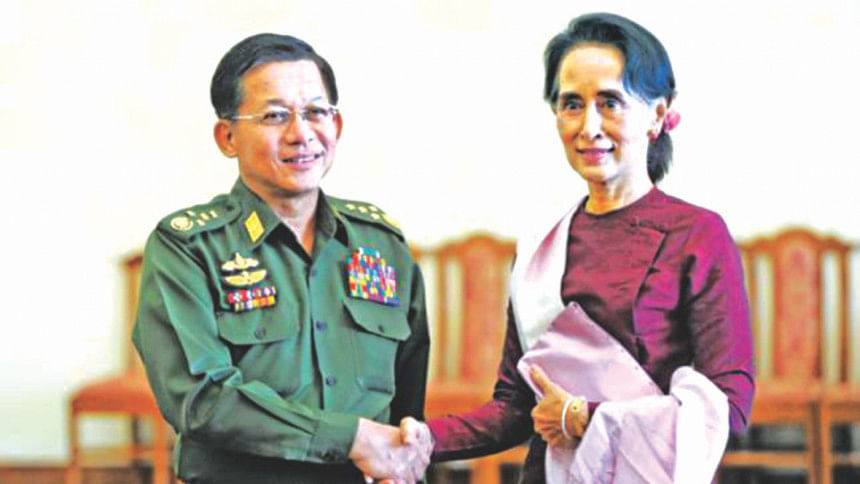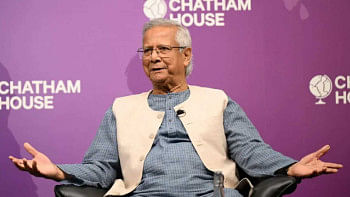Suu Kyi and the military: Are they falling out?

Things do not look very pretty for General Min Aung Hlaing of Myanmar, the alleged war criminal responsible for the genocide against the Rohingya community in Rakhine. As the ICC, UN, and regional and international organisations (G7, EU, OIC, Amnesty, UNHRC, etc.) pile pressures on Hlaing, relations between Aung San Suu Kyi and the army chief are becoming tenuous. However, xenophobic Hlaing is putting up a brave and defiant face, not realising that he may be indicted by the ICC for crimes against humanity.
Though of late, Suu Kyi, facing international ostracization, seems to have changed her tone. On May 31, 2018, her government announced that she would set up an independent National Commission of Inquiry to probe human rights violations that occurred during the brutal crackdown on Rohingyas in Rakhine state, leaving several thousands dead and driving over 700,000 to Bangladesh. This announcement from President Win Myint's office immediately put Hlaing at loggerheads with Suu Kyi.
The main point of contention between Suu Kyi's civilian government and the military is the composition of the commission. Hlaing took umbrage at not being consulted before the announcement, and the fact that there would be a foreign national in the three-member commission. Hlaing is deeply inimical to foreign experts delving into Myanmar affairs. A senior army officer working for Hlaing told Bangkok Post, "This is total anathema… to the army. It is a red line that can't be crossed…"
Then on June 6, Myanmar signed an MOU with UNDP and UNHCR to help with the voluntary return and reintegration of displaced Rohingyas. The military is jittery as the MOU will give all kinds of foreigners access to Rakhine. The other sore point for the military was the decision by the civilian government to allow UN Secretary General's Special Envoy on Myanmar Christine Schraner Burgener to open office in Naypyidaw. The army strongly believes that the country will be vulnerable to foreign interference and put its sovereignty at risk.
Soon after these developments, according to The Myanmar Times, a meeting of the powerful National Defence and Security Council (NDSC) took place at the Presidential Palace on June 8, where Hlaing reportedly clashed with Suu Kyi, threatening to dismiss the civilian government. It was UN Envoy Christine Burgener who apparently calmed down the two after several rounds of discussions. Later, however, Hlaing dismissed speculations of tensions between the military and the civilian government and also rejected all rumours of dissension between the government and the military.
Though over a month has elapsed, the commission could not be formed as those who were approached to join the commission declined the offer as "they find the post too hot to handle," said sources close to the selection process. Former East Timor President and Nobel Laureate Jose Ramos-Horta was offered the post of commission chair, when he met Suu Kyi on June 15 in Naypyidaw. According to Bangkok Post citing diplomatic sources in Myanmar, Horta regarded it "as a poison chalice" and refused to take the post describing it as a "difficult job".
Those approached were afraid because the panel is under immense international pressure to prove its independence and come up with credible results. But more importantly, the commission could not be formed as the military is opposed to the idea of including a foreigner in it, thus aggravating tension between Suu Kyi and Hlaing.
To make matters worse, the ruling National League for Democracy (NLD) party's spokesman U Aung Shin, echoing Suu Kyi, said the party would no longer protect human rights abusers. Suu Kyi's turnaround is surprising if compared to her speech in September 2017 to the parliament where she denied the military's wrongdoing and said that the media was hiding behind an "iceberg of misinformation". The spokesman further said that by allowing the UN envoy to establish office in Naypyidaw, the NLD was signalling its willingness to work with the international community in solving the Rohingya crisis.
Clearly, Suu Kyi is now desperate to assert her powers as head of government and bring the maverick generals under restraint and end the Rohingya crisis. Suu Kyi is relying on international pressures to strengthen her hands in dealing with the military.
Naypyidaw is quite aware of the visits to Bangladesh (July 1-2) by UN Secretary-General António Guterres and the World Bank Chief Jim Yong Kim. Guterres said that the UN shall increase pressures on Naypyidaw, and categorically said that the Rohingya refugees have to go back to their homeland. Earlier, in late April 2018, a fact-finding mission comprised of UN Security Council members also visited refugee camps in Bangladesh. On June 29, Bangladesh Foreign Minister AH Mahmood Ali visited Beijing, where the Chinese Foreign Minister Wang Yi assured him that China will help in expediting the return of the Rohingyas to the Rakhine. In another development, on June 21, the Judges of ICC have asked Naypyidaw to respond by July 27, 2018 to a prosecution request that they consider hearing a case on the alleged deportation of Rohingya minorities to Bangladesh. Amnesty International has already documented incontrovertible evidence of atrocities committed by Hlaing's military.
All these developments reflect that there is tremendous international pressure on Hlaing and Suu Kyi, who are now visibly at loggerheads. U Ye Myo Hein, a founder of the Yangon-based Tagaung Institute of Political Studies, said the military might create a situation that would make it harder for the government to control the situation in Rakhine. And that might lead to imponderable outcomes, experts aver.
Mahmood Hasan is a former ambassador and secretary of Bangladesh government.





Comments